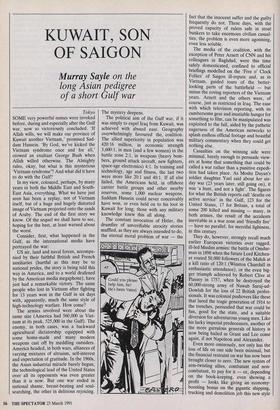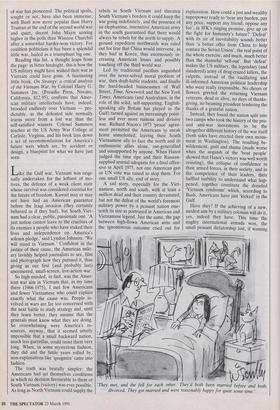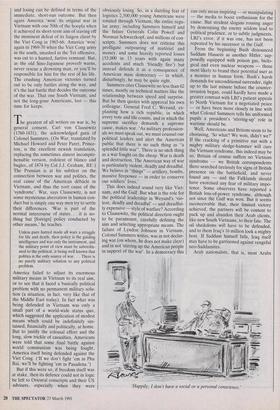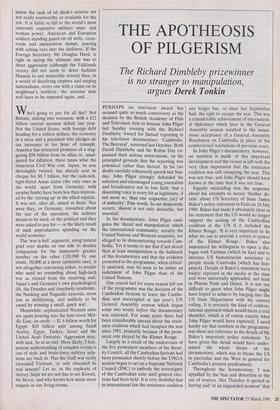KUWAIT, SON OF SAIGON
Murray Sayle on the
long Asian pedigree of a short Gulf war
Tokyo SOME very powerful names were invoked before, during and especially after the Gulf war, now so victoriously concluded: 'If Allah wills, we will make our province of Kuwait another Vietnam,' promised Sad- dam Hussein. 'By God, we've kicked the Vietnam syndrome once and for all,' crowed an exultant George Bush when Allah willed otherwise. The Almighty rules, okay, but what is this mysterious 'Vietnam syndrome'? And what did it have to do with the Gulf?
In my view, coloured, perhaps, by many years in both the Middle East and South- East Asia, everything. What we have just seen has been a replay, not of Vietnam itself, but of a huge and hugely distorted image of Vietnam projected onto the sands of Araby. The end of the first story we know. Of the sequel we shall have to see, hoping for the best, at least warned about the worst.
Consider, first, what happened in the Gulf, as the international media have portrayed the war: US air, land and naval forces, accompa- nied by their faithful British and French auxiliaries (hurtful as this may be to national prides, the story is being told this way in America, and to a world deafened by the American media megaphone), have just had a remarkable victory. The same people who lost in Vietnam after fighting for 13 years won in the Gulf in six days with, apparently, much the same style of high-technology warfare. How come? The armies involved were about the same size (America had 560,000 in Viet- nam at its peak, 525,000 in the Gulf). The enemy, in both cases, was a backward agricultural dictatorship equipped with some home-made and many modern weapons cast off by meddling outsiders. America headed, in both wars, alliances of varying mixtures of altruism, self-interest and expectation of gratitude. In the 1960s, the Asian industrial miracle barely begun, the technological lead of the United States over all its opponents was even greater than it is now. But one war ended in national shame, breast-beating and soul- searching, the other in delirious rejoicing. The mystery deepens.
The political aim of the Gulf war, if it was simply to expel Iraq from Kuwait, was achieved with absurd ease. Geography overwhelmingly favoured the, coalition. The allied superiority in population was 420:16 million, in economic strength 3,600:1, in men (and a few women) in the battle zone 2:1, in weapons (heavy bom- bers, ground attack aircraft, new fighters, space-age electronics) 4:1. In training and technology, age and fitness, the last two were more like 20:1 and 40:1. If all else failed, the Americans held, in offshore carrier battle groups and other nearby reserves, some 1,000 nuclear weapons. Saddam Hussein could never conceivably have won, or even held on to his loot in Kuwait for long; those with any military knowledge knew this all along.
The constant invocation of Hitler, the drumfire of unverifiable atrocity stories muffled, as they are always intended to do, the eternal moral problem of war — the fact that the innocent suffer and the guilty frequently do not. These days, with the proved capacity of rulers safe in stout bunkers to take enormous civilian casual- ties, the problem is even more agonising, even less soluble.
The media of the coalition, with the exception of Peter Arnett of CNN and his colleagues in Baghdad, were this time safely domesticated, confined to official briefings modelled on the 'Five o' Clock Follies' of Saigon ill-repute and, as in Vietnam, guided tours of the better- looking parts of the battlefield — but minus the roving reporters of the Vietnam years. Arnett and the others were, of course, just as restricted in Iraq. The ease with which television reporting, with its cumbersome gear and insatiable hunger for something to film, can be manipulated was exploited to the full, aided by the pathetic eagerness of the American networks to splash endless official footage and boastful military commentary when they could get nothing else.
Casualties on the winning side were minimal, barely enough to persuade view- ers at home that something that could be called a war rather than a punitive expedi- tion had taken place. As Moshe Dayan's soldier daughter Yael said about her six- day war (23 years later, still going on), it was 'a hunt, and not a fight'. The figures for what the British reports call 'deaths on active service' in the Gulf, 123 for the United States, 17 for Britain, a total of some 200 killed and missing — many, in both armies, the result of the accidents inevitable in a war zone and 'friendly fire' — have no parallel, for merciful lightness, in this century.
They do, however, strongly recall much earlier European victories over ragged, ill-led Muslim armies: the battle of Omdur- man in 1898 when the future Lord Kitchen- er routed 50,000 followers of the Mahdi at a kill ratio of 120:1 (Winston Churchill in enthusiastic attendance), or the even big- ger triumph achieved by Robert Clive at Plassey in 1757, when he destroyed the 60,000-strong army of Nawab Suraj-ud- Dowlah for the loss of 22 British profes- sionals. It was colonial pushovers like these that lured the tragic generation of 1914 to the trenches, persuaded that war could be fun, good for the state, and a suitable diversion for adventurous young men. Like his lucky imperial predecessors, another of the more garrulous generals of history is now being hailed as Grant and Lee come again, if not Napoleon and Alexander.
Even more ominously, not only has the loss of life on one side been minimal, but the financial restraint on war has now been brought closer to zero. The new system of arm-twisting allies, combatant and non- combatant, to pay for it — or, depending on the book-keeping, even showing a profit — looks like giving an economy- boosting bonus on the gigantic shipping, trucking and demolition job this new style of war has pioneered. The political spoils, sought or not, have also been immense, with Bush now more popular than Harry Truman at the end of the second world war and quiet, decent John Major scoring higher in the polls than Winston Churchill after a somewhat harder-won victory. For coalition politicians it has been a splendid little war, hailed as a triumphant big one.
Reading this list, a thought leaps from the page: in bitter hindsight, this is how the US military might have wished their war in Vietnam could have gone. A fascinating little book, On Strategy: a critical analysis of the Vietnam War, by Colonel Harry G. Summers Jnr, (Presidio Press, Novato, California, $12.95), confirms that Amer- ican military intellectuals have, indeed, brooded endlessly over Vietnam — pre- dictably, as the defeated side normally learns more from a lost war than the self-satisfied winners. Colonel Summers teaches at the US Army War College at Carlisle, Virginia, and his book lays down a set of recommendations for America's future wars which are, by accident or design, a blueprint for what we have just seen.
Like the Gulf war, Vietnam was origi- nally undertaken for the loftiest of mo- tives, the defence of a weak client state whose survival was considered essential for the future of freedom. Kuwait may or may not have had an American guarantee before the Iraqi invasion (they certainly behaved as if they had), but South Viet- nam had a clear, public, passionate one. 'A just nation cannot leave to the cruelties of its enemies a people who have staked their lives and independence on America's solemn pledge,' said Lyndon Johnson. 'We will stand in Vietnam.' Confident in the justice of their cause, the American milit- ary lavishly helped journalists to see, film and photograph how they pursued it, thus giving us our first (and probably last) uncensored, small-screen, live-action war.
So high-minded, in fact, was the Amer- ican war aim in Vietnam that, in my time there (1966-1975), I met few Americans and fewer Vietnamese who could explain exactly what the cause was. People in- volved in wars are far too concerned with the next battle to study strategy and, until they learn better, they assume that the generals must know what they are doing. So overwhelming were America's re- sources, anyway, that it seemed utterly impossible that a small backward nation, much less guerrillas, could resist them very long. When, in some mysterious fashion, they did and the futile years rolled by, non-explanations like 'quagmire' came into fashion.
The truth was brutally simpler: the Americans had set themselves conditions in which no decision favourable to them or South Vietnam (victory) was ever possible. As long as North Vietnam could supply the rebels in South Vietnam and threaten South Vietnam's borders it could keep the war going indefinitely, and the presence of an elephantine, insensitive American army in the south guaranteed that there would always be rebels for the north to supply. A ground expedition northwards was ruled out for fear that China would intervene, as they had in Korea, thus enormously in- creasing American losses and possibly touching off the third world war.
Led by traditional pacifists anguished over the never-solved moral problem of war, then draft-liable students, and finally the hard-headed businessmen of Wall Street, Time, Newsweek and the New York Times, Americans (and Australians, in the role of the solid, self-supporting, English- speaking ally Britain has played in the Gulf) turned against an increasingly point- less and ever more ruinous and divisive war. Richard Nixon's 1973 'peace' agree- ment permitted the Americans to sneak home unmolested, leaving their South Vietnamese ally to face the north and its enthusiastic allies alone, out-generalled and unsupported by anyone. When Hanoi judged the time ripe and their Russian- supplied arsenal adequate for a final offen- sive in April 1975, not one American gun or UN vote was raised to stop them. For one small US ally, end of story.
A sad story, especially for the Viet- namese, north and south, with at least a million dead and their country devastated, but not the defeat of the world's foremost military power by a peasant nation one- tenth its size as portrayed in American and Vietnamese legend. Just the same, the gap between high-flown American aims and the ignominious outcome cried out for explanation. How could a just and wealthy superpower ready to 'bear any burden, pay any price, support any friend, oppose any foe', in JFK's ringing promise, give up on the fight for humanity's future? 'Defeat' with its air of inevitability sounds better than 'a better offer from China to help contain the Soviet Union', the real point of the whole exercise, and much, much better than the shameful `sell-out'. But 'defeat' makes the US military, the legendary (and slandered) army of drug-crazed killers, the culprits, instead of the vacillating and ill-informed American political leadership who were really responsible. No cheers or flowers greeted the returning Vietnam veterans, dead or alive, no days of thanks- giving, no beaming president tendering the thanks of a grateful nation.
Instead, they found the nation split into two camps who took the history of the pro- and anti-war movements to be the altogether different history of the war itself (both sides have erected their own monu- ment in Washington). The resulting be- wilderment, guilt and shame (made worse when the anguish of the 'boat people' showed that Hanoi's victory was well worth resisting), the collapse of confidence in their armed forces, in their society, and in the competence of their leaders, their baffled inability to understand what hap- pened, together constitute the dreaded 'Vietnam syndrome' which, according to Bush, Americans have just 'kicked' in the Gulf.
Have they? If the achieving of a new, modest aim by a military colossus will do it, yes, indeed they have. This time the mighty international armada won, the small peasant dictatorship lost, if winning 'They met, and the fell for each other. They'd both been married before and both divorced. They got married and were reasonably happy for quite some time.'
and losing can be defined in terms of the immediate, short-run outcome. But then again America 'won' its original war in Vietnam with one 50th of the hoopla when it achieved its short-term aim of staving off the imminent defeat of its Saigon client by the Viet Cong in 1965-66. America 'won' again in 1969-70 when the Viet Cong army in the south, smashed in the Tet offensive, was cut to a hunted, furtive remnant. But, as the old Sino-Japanese proverb warns, never rescue a drowning man, or you'll be responsible for him for the rest of his life. The crushing American victories turned out to be only battles along the way, and it's the last battle that decides the outcome of the war. That one South Vietnam, and not the long-gone Americans, lost — this time for keeps.
The greatest of all writers on war is, by general consent, Carl von Clausewitz (1760-1831), the acknowledged guru of Colonel Summers. (On War, translated by Michael Howard and Peter Paret, Prince- ton, is the excellent newish translation, replacing the sometimes almost incompre- hensible version, redolent of blanco and bugles, of 1874 by Col J.J. Graham, RE.) The Prussian is at his subtlest on the connection between war and politics, the real cause of the American debacle in Vietnam, and thus the root cause of the 'syndrome'. War, says Clausewitz, is not some mysterious aberration in human con- duct but is simply one way men try to settle their differences. 'War is part of the normal intercourse of states. . . it is no- thing but [foreign] policy conducted by other means,' he teaches.
Unless pure hatred made all wars a struggle for life and death, then policy is the guiding intelligence and war only the instrument, and the military point of view must be subordin- ated to the political, it being well known that politics is the only source of war. . . There is no purely military solution to any political problem.
America failed to adjust its enormous military means in Vietnam to its real aim, or to see that it faced a basically political problem with no permanent military solu- tion (a situation, in fact, very like that of the Middle East today). In fact what was being defended in Vietnam was only a small part of a world-wide status quo, which suggested the application of modest means which could be indefinitely sus- tained, financially and politically, at home. But to justify the colossal effort and the long, slow trickle of casualties, Americans were told that some final battle against world communism was being fought. America itself being defended against the Viet Cong. ('If we don't fight 'em in Phu Bai, we'll be fighting 'em in Pasadena.') But if this were so, if freedom itself was at stake, then its defence could not in logic be left to Oriental conscripts and their US advisers, especially when they were obviously losing. So, in a dazzling feat of logistics 2,500,000 young Americans were rotated through Vietnam, the entire regu- lar army, including Summers himself and the future Generals Colin Powell and Norman Schwarzkopf, and millions of con- scripts. Summers does not criticise this profligate outpouring of materiel and money, and some heavily reported losses (53,000 in 13 years with again many accidents and much 'friendly fire') but instead defends it as a consequence of American mass democracy — in which, disturbingly, he may be quite right.
Summers cites Clausewitz no less than 62 times, mostly on technical matters like the relationship between speed and surprise. But he then quotes with approval his own colleague, General Fred C. Weyand, ex- plaining how a rich republic, in which every vote and life counts, and in which the supreme sacrifice demands a supreme cause, makes war. 'As military profession- als we must speak out, we must counsel our political leaders and alert the American public that there is no such thing as "a splendid little war". There is no mach thing as a war fought on the cheap. War is death and destruction. The American way of war is particularly violent, deadly and dreadful. We believe in "things" — artillery, bombs, massive firepower — in order to conserve our soldiers' lives.'
This does indeed sound very like Viet- nam, and the Gulf. But what is the role for the political leadership in Weyand's 'vio- lent, deadly and dreadful' — and dreadful- ly expensive — style of warfare? According to Clausewitz, the political direction ought to be paramount, carefully defining the aim and selecting appropriate means. The failure of Lyndon Johnson in Vietnam, Colonel Summers writes, was in not declar- ing war (on whom, he does not make clear) and in not 'stirring up the American people in support of the war'. In a democracy this can only mean inspiring — or manipulating — the media to boost enthusiasm for the cause. But strident slogans rousing anger by demonising the enemy seldom lead to political prudence, or to subtle judgments. LBJ's error, if it was one, has not been repeated by his successor in the Gulf.
From the beginning Bush denounced Saddam Hussein as another Hitler, sup- posedly equipped with poison gas, biolo- gical and even nuclear weapons — those most likely to brand their potential user as a monster in human form. Bush's harsh demands for unconditional surrender, right up to the last minute before the counter- invasion began, could hardly have made a greater contrast with LBJ's patient appeals to North Vietnam for a negotiated peace — or have been more closely in line with what Colonel Summers tells his uniformed pupils a president's 'stirring-up' role in wartime should be.
Well, Americans and Britons seem to be chorusing, 'So what? We won, didn't we?' If the cracking of a primitive nut with a mighty military sledge-hammer will cure the Vietnam syndrome, this indeed may be so. Britain of course suffers no Vietnam syndrome — we British correspondents there searched tirelessly for signs of British presence on the battlefield, and never found any — and the Falklands should have exorcised any fear of military impo- tence. Some observers have reported a British loss-of-power syndrome, although not since the Gulf was won. But it seems inconceivable that, their limited victory achieved, the partners will be content to pack up and abandon their Arab clients, like new South Vietnams, to their fate. The oil sheikdoms will have to be defended, and to them Iraq's 16 million look a mighty host. If Saddam himself falls, Iraq itself may have to be garrisoned against vengeful neo-Saddamites.
Arab nationalists, that is, most Arabs 'Happily, I don't have a social or a personal conscience.' below the rank of oil sheik's relative are not really trustworthy or available for the job. It is liable to fall to the world's most ruinously expensive military man- and woman power, American and European soldiers standing guard on oil wells, cross- roads and ammunition dumps, peering with aching eyes into the darkness. If the Foreign Secretary, Mr Douglas Hurd, is right in saying the ultimate aim was to deter aggression (although the Falklands victory did not seem to deter Saddam Hussein to any noticeable extent) then, in a world of dissolving empires and surging nationalisms, every one with a claim on its neighbour's territory, the exercise may well have to be repeated again, and. . . .
Who's going to pay for all this? Not Britain, sinking into recession, with a f12 billion current account deficit last year. Not the United States, with foreign debt heading for a trillion dollars, the economy in a mess and a president who pledges no tax increases in his hour of triumph. America has extracted promises of a stag- gering $58 billion from its allies or, unad- justed for inflation, three times what the American Civil War cost. Japan, its arm thoroughly twisted, has already sent its cheque for $8.7 billion, but the cash-rich, tight-fisted Asian states (the only ones in the world, apart from Germany, with surplus funds) have been less than impress- ed by the 'stirring up' in the allied capitals. It was not, after all, aimed at them. Nor were they, or Germany, consulted about the size of the operation, the military means to be used, or the political end they were asked to pay for — or the likely result of such unproductive spending on the world economy. The 'war is hell' argument, using natural grief over deaths on one side to deaden compassion for the immensely greater number on the other (150,000 by one count, 50,000 at a more optimistic one), is not altogether convincing either, to people who need no reminding about high-tech war as viewed from the receiving end. Japan's and Germany's own psychological ills, the Dresden and Auschwitz syndrome, the Nanking and Nagasaki neurosis, seem just as debilitating, and unlikely to be cured by winning a small, quick war: Meanwhile, sophisticated Western arms are again pouring into the hate-riven Mid- dle East, on credit —$1.6 billion worth for Egypt, $20 billion split among Saudi Arabia, Egypt, Turkey, Israel and the United Arab Emirates. Aggression may, with luck, be at an end. More likely, I fear, patient understanding of complex events is out of style and brute-force military solu- tions are back in. Has the Gulf war really exorcised Vietnam, or only obscured its real lessons? Let us, in the euphoria of victory, hope we are not due to see Kuwait, the Movie, and who knows how many more sequels in our living-rooms.





























































 Previous page
Previous page